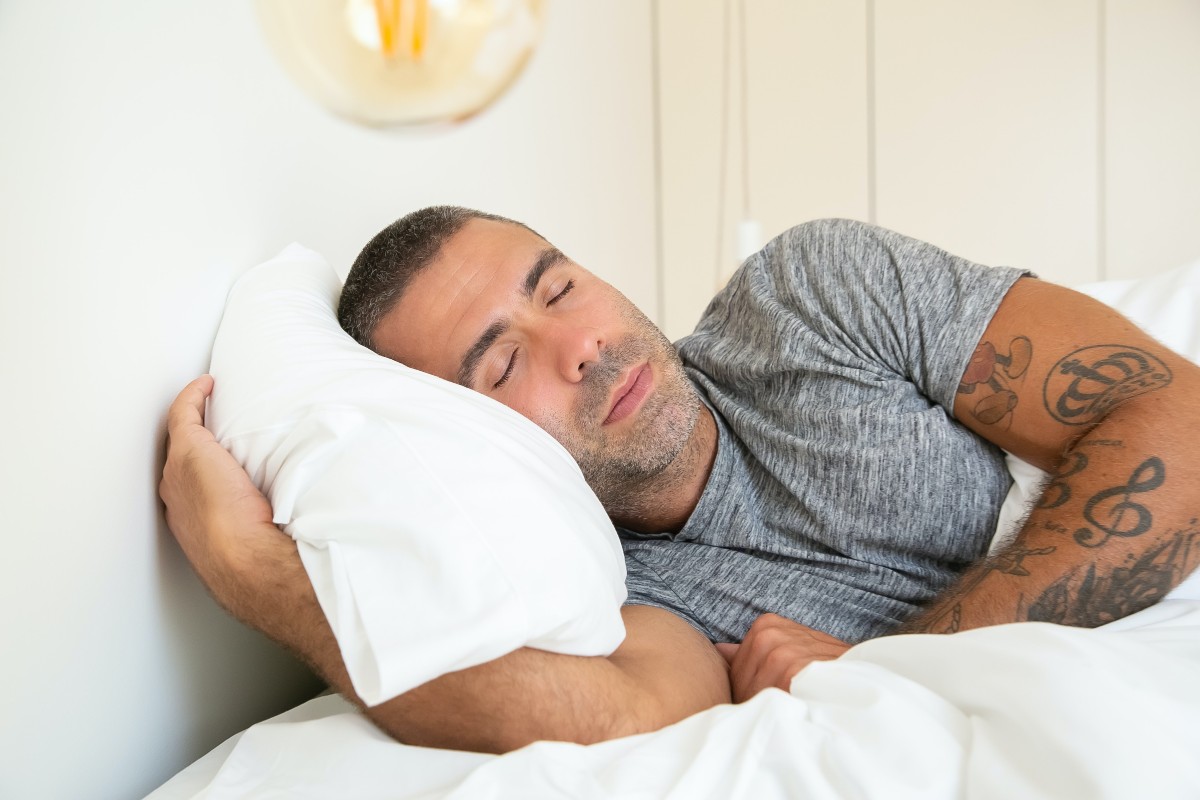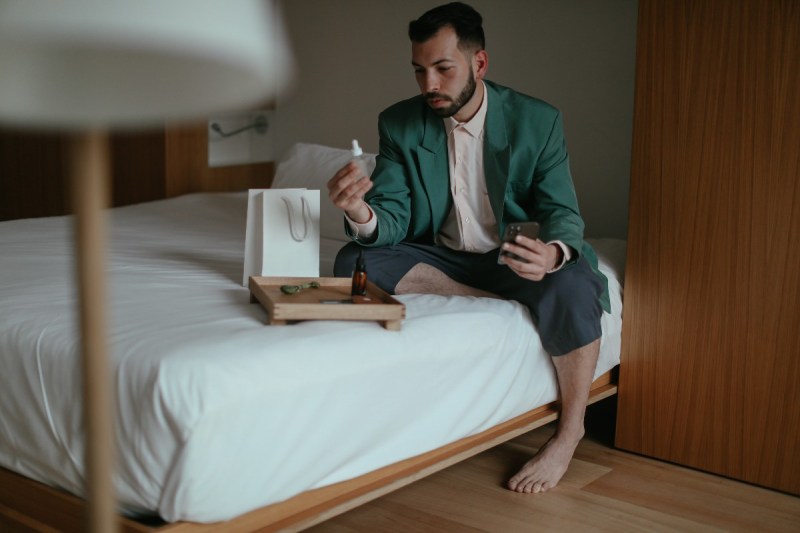
You’ve likely heard terms like “beauty sleep” and “sleeping beauty.” Putting aside the Disney character for a moment, people usually use these terms to describe the idea that going to bed earlier enhances your appearance. It turns out that this concept may not be an old wives’ tale.
You’ve likely heard about the importance of sleep for reducing risks of poor heart health, obesity, and depression. However, more z’s may have you loving your look when you look at that mirror on the wall. A small 2017 study of adults ages 18 to 65 found that just two nights of sleep restriction could reduce attractiveness.
In addition to the basic act of hitting the hay at a reasonable hour, there are other ways to get more handsome in your sleep. Here’s how to optimize your nighttime skincare routine so you, too, can become a true sleeping beauty.

Sleep and skin: What the science says
Sleep is mentally and physically restorative, and that includes benefits for the skin. A 2015 study found that poor sleep reduced the skin barrier’s function and was linked to signs of aging, such as dark under-eye circles. Another study showed that people who got less sleep were more likely to have red, swollen eyes, paler skin, and dark undereye circles.
Why is this? Your skin uses the time you’re asleep to rebuild itself, including regenerating skin cells more quickly than it does during the day. In other words, if better heart health and overall well-being weren’t reasons enough to get the CDC-recommended seven or more hours of sleep every night, consider skincare your excuse to call it a night.

What to try to achieve better skin while you sleep
The skincare aisle alone can be overwhelming. Allow us to narrow down your nighttime skincare regimen.
Avoid long, too-hot showers or baths
A warm pre-bed bath between 104 and 108.5 degrees Fahrenheit can benefit your sleep quality, according to a 2019 meta-analysis. However, consider your skin’s health when choosing a temperature. Doctors prefer “lukewarm” showers that don’t exceed 105 degrees Fahrenheit. The good news? That’s in the range recommended for improved sleep quality. Limit showers to five to 15 minutes, particularly if you have psoriasis. Overly long or hot showers can dry out, irritate, and burn the skin, causing further damage.
Use these key skincare ingredients
The best ingredients for your nighttime skincare routine will depend on your unique body and grooming goals. A few commonly recommended ones:
- Retinol or retinoids. These vitamin A derivatives are proven to reduce signs of acne and aging. Retinols are typically available over the counter, but most retinoids are prescription-strength. Sometimes they can cause added sun sensitivity, something you have to worry less about after a nighttime application. (Always use prescription products at times as directed by a doctor.)
- Vitamin C. Not just for your morning orange juice, this antioxidant is found in skincare products. It may reduce wrinkles, dark spots, and acne.
- Hyaluronic acid. This ingredient is having a moment in 2022 that will likely continue. According to research, hyaluronic acid helps moisturize the skin and reduces wrinkles.
Build (and keep!) a nighttime routine for better skin
Your pre-bed skincare regimen doesn’t need to be rocket science. Essentially, it should look similar to your morning routine.
- Wash your face with a gentle cleanser using lukewarm water. Gentle is the keyword here. You shouldn’t feel like you’re stripping your face. Pat your face dry after washing — no rubbing!
- Apply any retinol treatment. This step goes next if it applies to you. These products tend to cause irritation and dryness, so it’s essential to use them before moisturizing.
- Moisturize. Use a moisturizer that you love. It should make your skin feel soft, smooth, and not oily. Many moisturizers have SPF, which isn’t necessary at night but won’t hurt. Some moisturizers are specifically marked for nighttime. It’s not necessary to choose one unless you find it works for you — it’s OK to experiment.
As a bonus, having a routine at night can also enhance sleep.
Use a silk pillowcase
Silk pillowcases may feel overly luxe and high-maintenance, but hear us out. Cotton pillowcases can roughen up the face during the night. It can irritate sensitive skin, cause creases, and exacerbate conditions like eczema. A smoother surface goes easier on the skin. Go ahead and treat yourself. You’ll thank us — and yourself in the mirror — in the morning. Whatever fabric you choose, be sure to wash your pillowcases every couple of days — or daily if you have acne or oily skin.

Should you perform a nighttime skincare routine every night?
Performing a nighttime skincare routine every night is generally recommended by dermatologists, but it can depend on your individual needs and lifestyle. Here’s why a nighttime routine each evening is beneficial.
Cleansing
Throughout the day, your skin accumulates dirt, oil, sweat, and makeup (if you wear it). Removing these impurities every night allows your skin to breathe and prevents clogged pores and breakouts.
Repair and rejuvenation
As mentioned earlier, while you sleep, your skin undergoes a natural repair process. A nighttime routine that you do regularly provides essential ingredients to support this process, promoting cell turnover and collagen production.
Hydration
Nighttime air can be drier, so using a moisturizer every night helps prevent dryness and maintain a healthy skin barrier.
Targeted treatments
Many skincare products, like serums and retinols, are more effective when used at night as they can be more sensitive to sunlight.

Final thoughts
Beauty sleep is not just a cutesy term. Research shows that your overall appearance, particularly the skin, can improve with more sleep. The skin replenishes and rebuilds during the nighttime hours, giving you one more reason to follow CDC guidelines and get at least seven hours of sleep. Taking lukewarm showers or baths in water no hotter than 105 degrees Fahrenheit can prevent dryness and damage. Keep showers to 15 minutes or less for the same reasons.
Your nighttime skincare routine will look similar to your daytime one, but you don’t need SPF. A gentle cleanser, retinol as applicable, and a moisturizer will do. It’s not necessary to get a specific night cream, but you may find you like it. Finally, when you’re ready to hit the hay, aim for a silk pillowcase. They don’t just feel luxurious — they can prevent irritation and creases as you rest.
Editors' Recommendations
- How to get rid of those annoying blackheads once and for all
- What are peptides, and do you really need them in your skincare routine?
- Does beard growth oil work? What you should know
- Get your facial hair in order: The best beard combs
- The 5 best body powders for men to help avoid embarrassing odors



